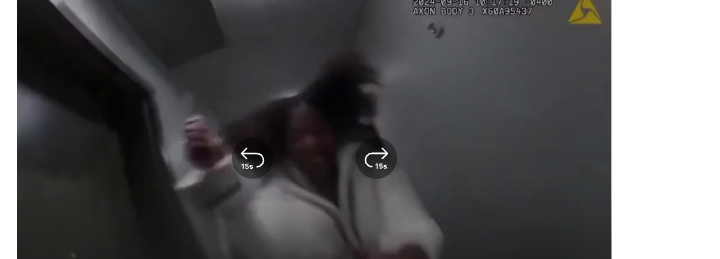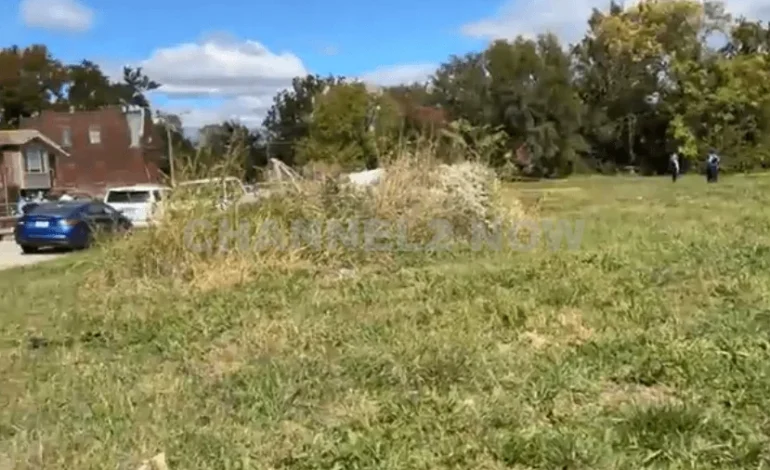Sydney Wilson Fatally Shot by Fairfax County Officer Peter Liu After Knife Attack in Reston, Virginia; Body Camera Footage Reveals Tense Moments Leading to Tragic Incident as Officer Faces Investigation
In a heart-wrenching tragedy that unfolded in Reston, Virginia, Sydney Wilson, a 33-year-old woman with a history of mental health issues, was fatally shot by Fairfax County Police Officer Peter Liu on September 16, 2024, following a tense confrontation at Wilson’s apartment on Sunrise Valley Drive. Recently released body camera footage by the Fairfax County Police Department sheds light on the moments leading up to the fatal encounter, during which Officer Liu, who had received crisis intervention training, was attacked by Wilson as he attempted to intervene in a situation that began with concerns over her mental well-being. The incident has left the community reeling as both a criminal and administrative investigation are underway to examine the officer’s actions and the events that led to Wilson’s death.
The body camera footage, made public after weeks of anticipation, provides a detailed account of the critical moments leading to the tragic death of Sydney Wilson. Officer Peter Liu, responding to a call from Wilson’s doctor, had been sent to perform a wellness check at her apartment after concerns were raised about her mental health. Upon arriving at the scene, Liu initially tried to engage with Wilson, who opened her apartment door briefly but appeared agitated, retreating inside and leaving the officer waiting outside for nearly ten minutes. The tension in the air was palpable, with Liu repeatedly calling out to Wilson in an attempt to de-escalate the situation.
What followed was a series of harrowing moments captured on the body camera that have since sparked widespread discussion and debate about mental health interventions, use of force, and crisis management in law enforcement. When Sydney Wilson finally emerged from her apartment, she was armed with a knife, and her behavior quickly became aggressive. The footage shows Wilson advancing towards Liu in a threatening manner, slashing at him with the knife as he retreated down the hallway. Despite Liu’s repeated attempts to warn Wilson and de-escalate the situation, she continued to press forward, forcing the officer into a corner and slashing him across the forehead with the knife.
The confrontation reached a critical point when, after giving at least eight verbal warnings, Officer Liu fired his weapon, discharging three rounds that struck Wilson as she lunged at him again. The footage reveals the intensity of the struggle, with both Wilson and Liu visibly shaken by the confrontation. After the shots were fired, additional officers arrived at the scene to provide assistance, and emergency medical personnel were called to transport Wilson to a nearby hospital. Despite their efforts, Wilson was pronounced dead upon arrival, leaving her family, friends, and community members devastated by the loss.
Fairfax County Police Chief Kevin Davis later addressed the incident in a public statement, describing Officer Liu’s actions as “valiant” and “exhibiting grace under pressure.” Davis emphasized that Liu had done everything in his power to avoid the use of deadly force, including giving numerous verbal warnings and attempting to create distance between himself and Wilson. However, given the severity of the threat posed by Wilson, who was 6’5” tall and weighed 330 pounds, the officer was ultimately left with no other option but to defend himself. Chief Davis expressed his condolences to Wilson’s family while also defending the actions of the officer, noting that Liu had sustained injuries during the attack.
For Sydney Wilson’s family, the tragic loss is compounded by the complexity of her mental health struggles, which had been a significant part of her life for years. Wilson, who had prior interactions with law enforcement due to her mental health issues, had been under the care of her doctor, who had requested the wellness check that ultimately led to her fatal encounter with police. Her death has raised important questions about how law enforcement handles cases involving individuals with mental health conditions and whether more could have been done to prevent the situation from escalating to a point of violence.
In the days following the release of the body camera footage, the community in Reston has been left grappling with the implications of the tragedy. Mental health advocates have called for a deeper examination of the protocols surrounding crisis intervention and the need for additional resources to support individuals like Wilson, whose mental health challenges may put them at risk during interactions with law enforcement. Many have expressed concerns that the situation, while difficult, could have been handled differently if mental health professionals were more integrated into the initial response to such calls.
At the same time, there is a deep sense of sorrow and mourning for Sydney Wilson, whose life was tragically cut short in the midst of a mental health crisis. Those who knew her described Wilson as a complex but loving individual who had faced numerous challenges throughout her life but had also shown incredible resilience and strength. Her family is devastated by the circumstances of her death and is currently seeking answers about what more could have been done to protect her in her time of need. As they grieve the loss of their daughter and sister, they are also hoping to bring attention to the broader issues surrounding mental health care and law enforcement responses to individuals in crisis.
Officer Peter Liu, who sustained a wound to his forehead during the confrontation with Wilson, has been placed on administrative leave pending the outcome of both a criminal and administrative investigation into the incident. The dual investigations will seek to determine whether Liu’s use of deadly force was justified under the circumstances and whether any policies or procedures need to be re-evaluated in light of what happened. In the meantime, Liu is receiving support from the department, with his fellow officers expressing their solidarity and recognizing the difficult nature of the situation he faced that day.
The tragic death of Sydney Wilson has sparked a broader conversation about how law enforcement agencies can improve their handling of mental health crises. Many advocates are calling for more training for officers in crisis intervention and de-escalation techniques, as well as increased collaboration between police departments and mental health professionals. Some have suggested that alternative models of response, such as deploying mental health crisis teams alongside or in place of law enforcement, could help prevent future tragedies like the one that claimed Wilson’s life.
As the investigations continue, Sydney Wilson’s death serves as a stark reminder of the challenges that arise when mental health issues intersect with law enforcement. Her loss has left a deep impact on the Reston community, and her memory will be honored by those who knew her best. Her family, while mourning her death, is also calling for systemic change to ensure that no other family has to endure the same pain they are now experiencing.
In the days ahead, both the criminal and administrative investigations will work to uncover the full truth of what happened on September 16, 2024, and what lessons can be learned from this tragic incident. For now, the community is left to mourn the loss of Sydney Wilson, a woman whose life was shaped by struggle but who also touched the lives of many with her resilience and strength. As her family seeks justice and answers, they are also advocating for a future where mental health crises are handled with care, compassion, and an understanding of the unique needs of individuals in distress.
Sydney Wilson’s death is a tragedy that has left a lasting mark on her family, her community, and the law enforcement officers involved. Her life, though cut short in a moment of crisis, will be remembered by those who loved her, and her story will continue to fuel discussions about the need for change in how mental health crises are managed in the future.




